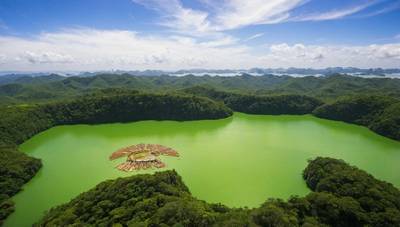Brazil's lawmakers revoke environmental permits ahead of the COP30 summit
The Brazilian Congress passed legislation Thursday that loosens environmental licensing. This could be a blow to President Luiz inacio da Silva, who is trying to improve his country's image as a green nation before it hosts the United Nations' global climate summit COP30 this year. The bill was passed by a large majority of Congress, where the powerful agribusiness group has a lot of influence. This is despite criticisms from environmentalists and members Lula's Cabinet, as well as European Union legislators who wrote last month to Brazil's lower-house speaker asking him to not put it to a vote.
In the lower house, 267 votes were cast in favor of the bill and 116 votes against it.
Brazilian business leaders have criticised environmental permits in Brazil as an obstacle to development. Many environmentalists are in agreement that the process needs to be reform, but they believe that the approach taken to date by Congress will do more harm than good.
Natalie Unterstell is the head of the Talanoa Institute - an environmental think tank.
The bill relaxes some of the requirements for permits. It allows for projects that are considered to have only a moderate or small impact, like dams and basic sanitation, to be constructed without environmental permits.
The Environment Minister Marina Silva said that the bill was a major setback and "dismantles' licensing in Brazil. However, some members of Lula’s cabinet had expressed earlier support for the legislation.
PRESSURE TO Drill
The bill passed at a time when Brazil's environmental agency Ibama is under intense pressure to grant a permit to state-run oil company Petrobras for drilling for oil off of the coast of Amapa in the Amazonian State. This region has a fragile eco-system and is considered Brazil's most promising frontier for oil.
Petrobras has been waiting over a decade for the permit to start this project. It is considered by Petrobras as its best chance at replenishing reserves.
Davi Alcolumbre - the head of the Senate and a native of Amapa - was furious at the delay. He has been pushing to develop the oil industry in this region, which is one of the most impoverished in Brazil.
Alcolumbre voted on the bill despite protests by government officials. He also added an amendment that some environmentalists believe is its most radical, allowing the federal government to accelerate projects they deem strategic.
Lula could still veto the bill in its entirety or parts of it, and send it back to Congress who would then be able to override his veto. The Supreme Court could also question its legality, as it has done in the past with other controversial environmental bills proposed by Congress. Reporting by Fabio Téixeira, Editing by Bernadette Blt and Chizu Nomiyama
(source: Reuters)



